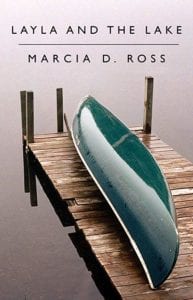
About the Book:
Layla, an aspiring poet and third string editor in Boston, brings her two children to visit her former in-laws at a lakeside cottage in rural Maine. There she is greeted with wariness, and there she discovers love and trouble across the water. Set in the early 1980s, with interludes glimpsing the past, LAYLA AND THE LAKE releases vivid emotional scenes from both the United States and Canada into an idyllic but tense setting. Gradually, a labyrinth of faulty ethics, expectations, and boundaries is revealed as Layla struggles to mend her messy life and protect her children’s future. The story exposes the harsh fallout from a failed marriage and a quest for writing with courage in the midst of a doomed affair that itself takes place amid a family crisis. LAYLA AND THE LAKE is the story of a family that is no longer a family. Its narrative mines the riches of the written word, the awakening of conscience in even the very young, and the inexplicable beauty of natural existence.
Read an Excerpt:
Featured In June/July 2019 Issue: Summer Reads
“Soon the canoe entered a region where the force of the wind was reduced, and Layla heard the crashing of waves and breaking of branches on shore well before an obscure land mass was discernible on her right. Her relief was profound, and she gave a loud sob.
But she must think, she must think! There was every indication that she had indeed arrived at that protected and uninhabited eastern end of the lake; and she understood that if she kept the land to her right, it would be possible to return to the Hunt cottage by traveling around the remaining periphery of the lake where she would be neither driven onto rocks nor in serious danger if she capsized. But. It would be four or five miles at least to reach the cottage that way, and she felt tired and dizzy—her biceps were shuddering with exertion—and the trees and fauna on land as she drew closer appeared as ghostly, tossing, dream-like shapes, without hue, without ground. Though the entire object of her present existence was at hand, that queer sensation of being lost and nonexistent returned. Shapes or no shapes, it was all the same, a world without boundaries or definition. Even the place where land and water met, this threshold so close by, was creepy with ambiguity. Her hands and feet were chilled, and a terrible sense of isolation had come over her; all thrill and danger and relief were overtaken by emptiness. And now she knew: it was more than a shore she wanted. It was more than north, north to nothing but crawling cowardly back to a place where even her love for her children seemed out of place–she longed to find or be found, to have this vacancy of loneliness filled with human company, the company of one other person, one only.
Layla almost laughed at her easy self-deception. No doubt she had been looking for him from the start. “And why not?” she allowed. He was at least something definite and dry, something else than this blundering and flailing about, this reveling in nothingness, this mere athletic extension of visiting with people who hated her, who only tolerated her presence.”
